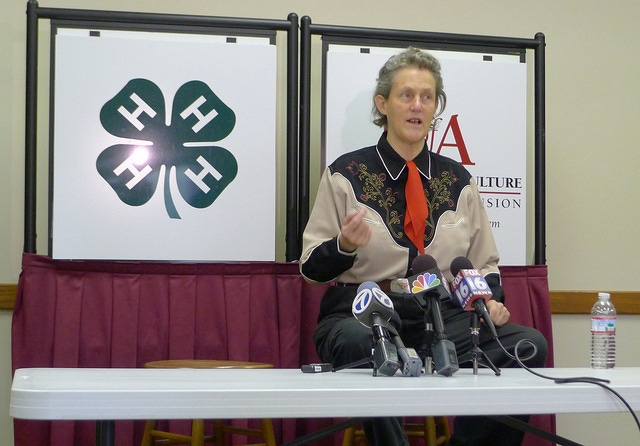August 13, 2012

Youth in agriculture should use social media to show their city counterparts the positive work they do with animals, Temple Grandin told 4-H and FFA members Sunday at the C.A. Vines Arkansas 4-H Center.
Grandin, a professor at Colorado State University, is known worldwide for her work in animal welfare. Diagnosed with autism at an early age, she has brought her personal experiences to research and advocacy for those with autism. As a youngster, she was a 4-H member who enjoyed equine activities.
More than 200 people spent much of their Sunday at the 4-H Center, taking part in learning activities, watching the Emmy-award winning HBO biopic about Grandin’s life, then hearing her speak about how animal think and techniques for handling animals without causing them stress. Grandin also autographed books; with the line for her signature winding around three walls of the auditorium.
Her straight talk about education, showing livestock and public perceptions of agriculture drew a standing ovation from the crowd.
"People living in the cities are totally separated from agriculture," she said. "They don't know anything about beef cattle. They think that beef cattle grow up in a feed lot. They don't know that cattle are born naturally out on the ranch.”
"You need to talk to your friends in the cities," Grandin said. "Show people the good things you're doing with your animals."
She urged 4-Hers to "Put up YouTube videos of what you're doing with horses, steers, chickens or rabbits."
"The thing I've found is that what's considered chores for you, the general public finds interesting," Grandin told the audience.
She described the media attention that surrounded the release of the HBO biography. "They were just asking curiosity questions, 'What does a broiler shed really look like?'
"People actually want to know where their food is coming from.”
Grandin said that "about 20 percent of my students have never touched cattle."
As part of her classes, she makes sure the livestock handling students do get a chance to have contact with cattle. "That's a big deal for someone who's never touched cattle."
Animals can help humans too.
"I think animals do give us peace," she said, adding that there is a growing body of research evidence to show that.
Caleb Shepherd, 4-H ambassador from Howard County, said he appreciated the opportunity to learn from Grandin, especially, “all the different methods that I was not familiar that are used for handling animals.”
Both Taylor Mcneel, a 4-H ambassador from Faulkner County and Sabrina Rivas, a 4-H ambassador from Sevier County, planned to put social media to work.
“Oh yes,” Mcneel said with a laugh. “Especially since fair is coming up. We’re going to put it up on Facebook -- ‘come see us at the fair.’”
Rivas said she would be Facebooking all her photos.
Anne Sortor, who heads the 4-H youth development program for the University of Arkansas Cooperative Extension Service, said Sunday was a truly unique opportunity for Arkansas youngsters. “Today was a wonderful day because we did have Dr. Temple Grandin here with us and it’s been an excellent opportunity for our 4-Hers and volunteers to interact with such a renowned person. She was very personable.”
To learn more about 4-H visit http://kidsarus.org or contact your county Extension office.
You May Also Like




